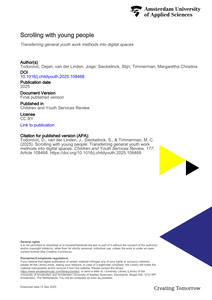The online lifeworld gives adolescents various opportunities to meet their developmental needs. Not all young people benefit from these opportunities. They encounter negative experiences, have difficulties fulfilling their needs and engage in risky and harmful behaviours in the online lifeworld. This poses challenges for Dutch youth work professionals, as little is known about the digital lives of Dutch adolescents and the challenges they encounter when meeting their developmental needs in the online lifeworld. In this qualitative study, a photovoice method was used to collect screenshots from adolescents (N = 175) concerning their experiences and needs in the online lifeworld. Six types of developmental needs in the online lifeworld were distinguished. The article concludes that understanding how adolescents use online affordances to fulfil their developmental needs is a starting point for all youth work professionals in providing adequate support to adolescents in the online lifeworld.
DOCUMENT
The online environment, where the boundaries between the domains of home, school, work, and leisure are blurred, poses new challenges for youth work practice. Due to limited research on this subject matter, the theoretical underpinnings of the online youth work practice are constrained. The fulfilment of youth work’s aims online, the position it can take in the online context, and its relation to its partners in the online lifeworld need a theoretical base. This paper seeks to analyse the role of youth work in the online lifeworld according to adolescents and youth work’s partners. The research was conducted in the Netherlands in collaboration with 14 youth work organisations. A qualitative research design was used: group conversations with young people and semi-structured interviews with youth work’s partners (i.e., parents, schools, informal networks, neighbourhood support teams, police, and municipal officials). The findings indicate that youth work in the online lifeworld, according to the respondents, is part of the general youth work practice, with a primary role of addressing the developmental needs of young people and creating new developmental opportunities. This role is expected to be fulfilled by engaging and connecting with young people in the online lifeworld and providing them instrumental, informational, socioemotional, and cognitive support. To do so, according to the partners, youth workers can make use of their vantage position in the online relationship with adolescents in order to access online information relevant for support and prudent prevention aimed at adolescents’ development. This vantage position may potentially encourage a collaboration between young people and partners, and between the online and offline youth work practice.
DOCUMENT

With the increasing significance of the online lifeworld in the lives of adolescents, youth work must adapt its methods to support young people’s personal development and social participation in this hybrid online space. To date, there is limited knowledge on how youth workers can effectively employ methodical actions in the online environment. This paper draws on established offline youth work methods to explore their potential transferability to the online context. The research question guiding this study is: How can offline youth work methods be used in the online lifeworld to support adolescents’ developmental needs? Using the Change Laboratory method, 26 youth workers from 14 youth work organisations in the Netherlands participated in this research. The findings suggest that while offline methods provide a valuable resource, they cannot be directly transferred to the online context without adaptation. Instead, they offer a framework for seven specific methodical actions that can be adapted or developed for the online context. They are: 1) Increasing online visibility and accessibility, 2) Orienting, 3) Signalling, 4) Making contact, 5) Building meaningful relationships, 6) Assessing needs, and 7) Providing support. By identifying these seven methodical actions which are crucial for addressing the developmental needs of adolescents online, this paper contributes to the growing body of knowledge on youth work in the online lifeworld.
DOCUMENT
